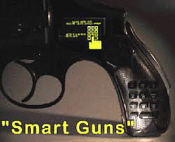

Biometric 'Skyfall' gun neither new nor 'smart'
![]()
David Codea Nov 17 2012
Article source
 The new James Bond movies, "Skyfall," has "a weapon we should actually make," Dave Guston and Ed Finn of Slate.com gushed in a November 14 report on a "personalized gun" movie prop used in this latest blockbuster in the 007 franchise.
The new James Bond movies, "Skyfall," has "a weapon we should actually make," Dave Guston and Ed Finn of Slate.com gushed in a November 14 report on a "personalized gun" movie prop used in this latest blockbuster in the 007 franchise.
"Unlike many of Bond's gizmos, it turns out that Daniel Craig's biometric Walther PPK/S might be a very good idea," the pair speculated. "Maybe biometric guns could reduce the gang violence that contributes more than 90 percent of U.S. homicides, most of them committed with illegal firearms."
Then again, maybe they could not.
That much of the public hero-worships armed government employees (or at least the pretenders who play them), and ones with licenses to kill at that, is a phenomenon worth noting, as is using such entertainment as a springboard to prime that public to be receptive to new laws. And it's not like the Bond actors haven't been a willing part of using their media influence to do just that, including Sean Connery, Roger Moore, Pierce Brosnan and Craig himself, who, when introduced as the new 007 told OK! Magazine, "I hate handguns. Handguns are used to shoot people and as long as they are around, people will shoot each other."

And let's not get started on the "peace-loving actor" Javier Bardem, who plays Skyfall's "flamboyant" villain, Raoul Silva.
The concept of "smart guns" has been bandied about for years, initially generating wider notice with a federal grant to Sandia National Laboratories back in the Nineties. The problem to be studied revolved around police killed with their own service weapons in "takeaway" incidents. So naturally, when states such as New Jersey and Maryland put personalized firearm provisions in their laws in anticipation of the technology becoming developed enough to mandate, as Guston and Finn endorse with giddy fanboy fervor, certain bait and switch exemptions had to be made.
"New Jersey's 'smart gun' bill may ultimately do just the opposite of what it claims to do by forcing gun owners in that state to purchase unreliable firearms, unsafe for self defense," attorney, activist and author Dave Kopel concluded after studying the law. "You say you want proof? New Jersey won't ask its own law enforcement officers to use them."
Special rules for the "Only Ones" has always been a hallmark of "gun control," and a prime mover behind "smart guns" is one of the citizen disarmament lobby's most zealous proponents, the Law Center to Prevent Gun Violence (formerly the Legal Community Against Violence), a recipient of largesse from a major bankroller of anti-gun Astroturf endeavors, the Joyce Foundation. But fortunately, all parties aren't unified on the concept, and in a very public "there was war in Heaven" dissent, another Joyce beneficiary, none other than the hard-line Violence Policy Center, showed a rare grasp of cause and effect when it declared "smart guns" were a "false hope," and, coming around full circle, concluded any likely benefits would center around putting them in the holsters of the police to help prevent takeaway incidents!
Putting aside the performance complications -- and since when does adding impediments to a tool's function improve its performance? -- there are an estimated 270,000,000 guns currently in private hands in the United States, per GunPolicy.org, itself a proponent of global gun laws, so these aren't "gun lobby" numbers, but those admitted by its opponents. Put another way, there are 88.8 guns per every 100 households. The logistics of removing existing gun stockpiles would be a practical impossibility, and that's assuming a critical mass of the population would not rise up and forcibly resist such efforts.
To further think that those perpetrating "gang violence" would in any way be inclined to participate or be impacted, as the Slate.com piece suggests, is just ignorant and childish, despite their ploy to add an unmerited appearance of authority by advising readers "This article also appears on As We Now Think, a site edited by the Consortium for Science, Policy, and Outcomes at Arizona State University."
That hardly equates with being peer-reviewed, but the association of empirical legitimacy has been implied, which was no doubt the intent for so conspicuously posting the aggrandizing notice.
 And there are other factors that haven't been considered, such as adding stupid electronic doodads that would price defensive tools out of the range of those of modest means, making a gun that's useless to the weak hand if the dominant one becomes disabled, taking away the option for gloves in cold weather, endangering the user if mud, water, blood or other unforeseeable environmental conditions come into play, turning a firearm into an expensive paperweight should the owner fall and a family member become the next line of defense, etc., not to mention if you've ever pointed a remote control at a television or a garage door and had nothing happen. Whichever company finally ends up marketing a personalized firearm had better have very good liability insurance, as defective products aren't exempted under the Protection of Lawful Commerce in Firearms Act.
And there are other factors that haven't been considered, such as adding stupid electronic doodads that would price defensive tools out of the range of those of modest means, making a gun that's useless to the weak hand if the dominant one becomes disabled, taking away the option for gloves in cold weather, endangering the user if mud, water, blood or other unforeseeable environmental conditions come into play, turning a firearm into an expensive paperweight should the owner fall and a family member become the next line of defense, etc., not to mention if you've ever pointed a remote control at a television or a garage door and had nothing happen. Whichever company finally ends up marketing a personalized firearm had better have very good liability insurance, as defective products aren't exempted under the Protection of Lawful Commerce in Firearms Act.
No one is saying such technology may not have applications, as long as it is a personal choice, and even then, the superior one would be for the human operator to get more training. Thankfully, the improbability, at least as foreseeable for now, of such gadgetry becoming an imminent legislative threat is remote, and that's a good thing, steam room noises from the anti-gun males at Slate notwithstanding.
Because there's another danger to the right to keep and bear arms if that ever changes, as this correspondent wrote in a Guns and Ammo Magazine column in 2002 and restated in Gun Rights Examiner when it was reported that remote control automobile shut-offs were being developed for police use:
As writer Vin Suprynowicz warns (and I and some others independently predicted), this technology could be used by the police as "an `electronic master key' to `disable' any `smart guns' in the house," and be used as a pretext to "ban the manufacture of any gun that ISN'T a `smart gun'."
Naturally, we should expect an exemption for agents of the state, secret or otherwise.
--------------------------------David Codrea posts regularly on Gun Rights Examiner and Facebook (David Codrea) and Twitter (@dcodrea). Be sure to visit "The War on Guns: Notes from the Resistance."
![]()



































